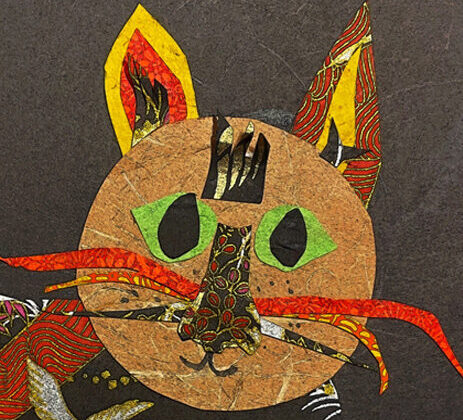Tanya McDonald and Lew Watts
Whitecaps
a kinglet
among beach stones
glint of olivine
I’d often hear him in the middle of the night, stepping down the stairs before opening the cellar door. Nan had made him sound-proof his workshop, but I could always hear him coughing below the low-pitched growl of the rock tumbler. By morning, every finger bowl was filled with fresh colors, the pebbles polished and gleaming.
shared bathroom Grandpa’s glass eye in the jar
I never find more than fragments and curved shards, most of them scattered around camp and within a dense thicket of adolescent pines. My family has been camping along this creek for three generations. From the evidence of burnt beer cans and crossbars nailed between trees, deer hunters have used the place, too. Flat ground, close to accessible water, sheltered from the wind. It’s a good spot. As I wander back to camp, morning sunlight catches on a piece of charcoal leftover from a clearcut thirty years ago. Next to it, the sharper shine of obsidian. I pluck it from the reddish-brown dirt, my fingertip tracing the worked edge to the point where the tapered tip broke off.
first pocketknife—
the ponderosa snag
weathered white
It was the day I got hung up on the church tower. I remember there was a strong easterly wind, unusual for Spring, and I must have drifted off the graveyard. The lake seemed featureless this far above the dam, but those tombs and headstones were a haven for large trout. After cutting the motor, I threw out a few curses and tugged until the line was free. Suddenly, a huge weight almost pulled the rod from my hands. They say the pike lived in the belfry, lunging out at whatever passed. When I brought him to the boat he thrashed in a frenzy of spray. That’s when I saw the old rusty hook, tucked into the corner of his opaline eye. After one final splash he slid away, the bubbles shifting from red to pink.
out of sight still tearing up to The Bells of Aberdovey
Hours before the first thunderclap, I stood on the bank of the Severn, licking the last granules of sugar from my lips. In five days of rambling around the Cotswolds, I’d yet to see a kingfisher, though not for lack of looking. But I was confident that today, between the glassy green water and the serendipity of finding a custard-filled doughnut at a weekly farmers’ market, I’d be treated to a flash of turquoise at any moment. Ebullient birdsong from the bushes. I raised my binoculars, and then lowered them, afraid I’d miss a kingfisher as it flew past. Long-tailed tits flitted across the river in ones and twos. A grey heron lurked among the willow shadows, a picture of patience. I raised my binoculars. Lowered them.
distant rumble—
deep in my pocket
the river’s IOU
“Aye, I mean you,” Angus says, prodding his glass of Highland Park into my chest. His sleeve smells of the sea, and his front teeth are stained and blackened at the roots. I am the new first mate on his lobster boat. Beside me, the scrape of a bar stool. A red-bearded youth turns and limps away from the bar. This is Jimmy, his face wincing with each infected step. “Eel was in the first pot—bit right through his welly,” Angus told us as we queued for the pub’s doors to open. Now, three hours later, Angus is ready for his lunch. He drains his glass with three final swigs, gives his crotch a quick jerk, and sniffs. “Alright, time to get home and sort out the missus,” he says with a wink. “See you tomorrow at three.”
the gun-metal gray of moonlit waves— Scapa Flow
Money for college, I remind myself, kicking a paper clip across the slick, concrete floor. I’m on my way back to the shred deck for the last four hours of my shift. Everyone’s on break, and the radio’s still blasting the Oldies station. And then I see it, the round handle rising from the end of a wooden crate. I know I shouldn’t—safety regs and all that—but oh, it’s been so long. A quick glance that the coast is clear. I slide it out from under the crate. That familiar rattle of wheels turns me into a ten-year-old. I mount the forks and push off like it’s an oversized scooter . . . just like I remember, my sisters begging for their turns. Gliding down the aisle, I take the corner wide, wobble, but don’t fall off. The Beatles can keep their Yellow Submarine—I’ve got a yellow pallet jack, and I feel fine.
first traffic ticket—
waiting until payday
to tell Mom
Sometimes, I need to feel the sting of salt in my eyes. I come here when I’m done, when nothing else can push the memory away. The wind is up today. If I linger long enough, the tide will turn. But for now, it’s rush hour for crabs, the rock pools crammed and gridlocked with shrimp and snails. Perhaps I’ll stay all day. Perhaps then the waves will reach my feet, or higher.
whitecaps . . . the howls as I enter her ward
Midnight, and I’m up on a chair, scrubbing the kitchen ceiling. Everyone else is either asleep or at the hospital. Fly specks, grease smudges, the husk of a pantry moth cocoon. I’ve already cleaned the top of the fridge, the cupboard doors, and the windowsill, dusting each shell and knick-knack before returning it to its place. Next, I’ll mop the linoleum floor. As if it matters. As if we’ll get to bring her home as anything but ashes.
until
I’m out of breath
dandelion seeds
Note: Regular text: Tanya McDonald. Italicized text: Lew Watts.
About the Authors

Tanya McDonald is a Seattle-area poet and editor of the haiku journal Kingfisher. She is often distracted by birds.

Lew Watts is the haibun co-editor of Frogpond and the author of Tick-Tock (Snapshot Press, 2019), a haibun collection that received an Honorable Mention in the Haiku Society of America’s 2020 Merit Book Awards. His publications also include the novel Marcel Malone and the poetry collection Lessons for Tangueros. He lives in Chicago.
